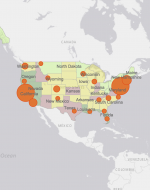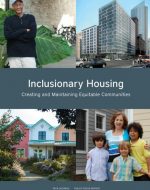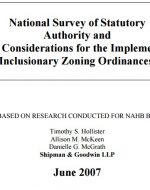Inclusionary housing programs generally rely on a local government’s power to regulate land use. While the right of government to use its zoning power in this way has been established and upheld for generations, this is still a rapidly evolving area of law. Recent federal court decisions have limited zoning power in ways that don’t prohibit most inclusionary housing programs but can influence how they are designed.
The Lincoln Institute of Land Policy’s report “Inclusionary Housing: Building More Equitable Communities” includes a detailed review of the relevant case law by Ben Beach which concludes:
State and federal courts have repeatedly upheld inclusionary housing measures, which have been adopted by hundreds of jurisdictions across the country. While some state laws have substantially limited the options available to local policymakers, in any jurisdiction there is almost always a path to an effective, legally defensible inclusionary policy.
In addition to federal legal considerations, state law can impact the design of inclusionary housing in significant ways. In some states—including Arizona, Colorado, Idaho, Indiana, Kansas, Texas, Tennessee, and Wisconsin—local governments are prohibited from adopting at least some form of mandatory inclusionary housing (for ownership housing, rental housing, or both). In some cases, the court has determined that the state statute limiting local rent control preempts mandatory local inclusionary housing requirements for rental housing.Many states—including Alabama, Arkansas, Georgia, Illinois, Iowa, Kentucky, Michigan, Mississippi, Missouri, and New Mexico, North Carolina, South Carolina, North Dakota, South Dakota, Oklahoma, Texas, Utah, and Washington—also have state statutes prohibiting local rent control but there has not been litigation regarding whether that statute preempts inclusionary housing requirements for rental housing.
Policymakers interested in adopting inclusionary housing policies must work closely with legal counsel to design a program that anticipates potential challenges under federal or state law.






